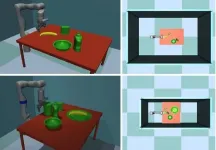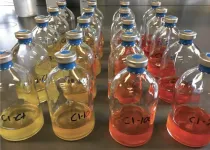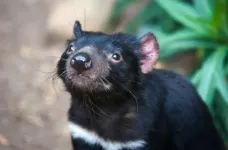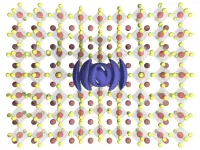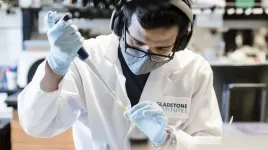(Press-News.org) What if a robot could organize your closet or chop your vegetables? A sous chef in every home could someday be a reality.
Still, while advances in artificial intelligence and machine learning have made better robotics possible, there is still quite a wide gap between what humans and robots can do. Closing that gap will require overcoming a number of obstacles in robot manipulation, or the ability of robots to manipulate environments and adapt to changing stimuli.
Ph.D. candidate Jinda Cui and Jeff Trinkle, Professor and Chair of the Department of Computer Science and Engineering at Lehigh University, are interested in those challenges. They work in an area called learned robot manipulation, in which robots are "trained" through machine learning to manipulate objects and environments like humans do.
"I've always felt that for robots to be really useful they have to pick stuff up, they have to be able to manipulate it and put things together and fix things, to help you off the floor and all that," says Trinkle who has conducted decades of research in robot manipulation and is well known for his pioneering work in simulating multibody systems under contact constraints. "It takes so many technical areas together to look at a problem like that."
"In robot manipulation, learning is a promising alternative to traditional engineering methods and has demonstrated great success, especially in pick-and-place tasks," says Cui, whose work has been focused on the intersection of robot manipulation and machine learning. "Although many research questions still need to be answered, learned robot manipulation could potentially bring robot manipulators into our homes and businesses. Maybe we will see robots mopping our tables or organizing closets in the near future."
In a review article in Science Robotics called "Toward next-generation learned robot manipulation," Cui and Trinkle summarize, compare and contrast research in learned robot manipulation through the lens of adaptability and outline promising research directions for the future.
Cui and Trinkle emphasize the usefulness of modularity in learning design and point to the need for appropriate representations for manipulation tasks. They also note that modularity enables customization.
Cui says that those in traditional engineering may doubt the reliability of learned skills for robot manipulation because they are usually 'black-box' solutions, which means that researchers may not know when and why a learned skill fails.
"As our paper points out, appropriate modularization of learned manipulation skills may open up 'black-boxes' and make them more explainable," says Cui.
The nine areas that Cui and Trinkle propose as particularly promising for advancing the capacity and adaptability of learned robot manipulation are: 1) Representation learning with more sensing modalities such as tactile, auditory, and temperature signals. 2) Advanced simulators for manipulation so they are able to be as fast and as realistic as possible. 3) Task/skill customization. 4) "Portable" task representations. 5) Informed exploration for manipulation in which active learning methods can find new skills efficiently by exploiting contact information. 6) Continual exploration, or a way for a learned skill to improve continually after robot deployment. 7) Massively distributed/parallel active learning. 8) Hardware innovations that simplify more challenging manipulations such as in-hand dexterous manipulation. 9) Real-time performance since, eventually, learned manipulation skills will be tested in the real world.
Following some of these directions, Cui and Trinkle are currently working on tactile-based sensorimotor skills to make robot manipulators more dexterous and robust.
For Cui, among the most exciting discoveries he made while exploring the current research is that learned robot manipulation is still in its infancy.
"That leaves many opportunities for the research community to explore and thrive on," says Cui. "The promising future and the vast space for exploration will make learned robot manipulation an exciting area of research for decades to come."
INFORMATION:
To learn more about their work, read: Advancing Robotic Grasping, Dexterous Manipulation & Soft Robotics.
PITTSBURGH, May 26, 2021 - In a paper published today in Science Advances, researchers from the University of Pittsburgh School of Medicine showed that inhalable nanobodies targeting the spike protein of the SARS-CoV-2 coronavirus can prevent and treat severe COVID-19 in hamsters. This is the first time the nanobodies--which are similar to monoclonal antibodies but smaller in size, more stable and cheaper to produce--were tested for inhalation treatment against coronavirus infections in a pre-clinical model.
The scientists showed that low doses of an aerosolized nanobody named Pittsburgh inhalable Nanobody-21 (PiN-21) protected hamsters from the dramatic weight loss ...
An inhalable nanobody-based treatment may effectively prevent and treat SARS-CoV-2 infections when administered at ultra-low doses, according to a new study in Syrian hamsters. This novel therapy, Pittsburgh inhalable Nanobody 21 (PiN-21), could provide an affordable, needle-free alternative to monoclonal antibodies for treating early infections. Sham Nambulli and colleagues recently developed PiN-21, which uses single-domain antibody fragments that are cheaper to produce than monoclonal antibodies. However, until this study, the efficacy of PiN-21 had not been reported in living organisms. To advance the development of this treatment, Nambulli et al. administered a 0.6 milligram per kilogram ...
Piscine orthoreovirus (PRV) - which is associated with kidney and liver damage in Chinook salmon - is continually being transmitted between open-net salmon farms and wild juvenile Chinook salmon in British Columbia waters, according to a new genomics analysis published today in Science Advances.
The collaborative study from the University of British Columbia (UBC) and the Strategic Salmon Health Initiative (SSHI) -- a partnership between Fisheries and Oceans Canada (DFO), Genome BC and the Pacific Salmon Foundation -- traces the origins of PRV to Atlantic salmon farms in Norway and finds that the virus is now almost ubiquitous in salmon farms in B.C.
It also shows that wild Chinook salmon are more likely to be infected with ...
Jodi Karnell and colleagues have developed a monoclonal antibody, VIB7734, that reduces symptom severity in people with cutaneous lupus by targeting and depleting plasmacytoid dendritic cells (pDC) in blood and skin. In two phase I clinical trials involving a total of 67 people with autoimmune diseases such as lupus, treatment with VIB7734 was as safe as a placebo and significantly reduced pDC frequencies, the researchers found. The antibody also reduced the activity of a group of key immune proteins called type 1 interferons in skin. Both pDCs and type 1 interferons are suspected ...
In the human gut, good bacteria make great neighbors.
A new Northwestern University study found that specific types of gut bacteria can protect other good bacteria from cancer treatments -- mitigating harmful, drug-induced changes to the gut microbiome. By metabolizing chemotherapy drugs, the protective bacteria could temper short- and long-term side effects of treatment.
Eventually, the research could potentially lead to new dietary supplements, probiotics or engineered therapeutics to help boost cancer patients' gut health. Because chemotherapy-related microbiome changes in children are ...
MOSCOW, Idaho -- May 26, 2021 -- University of Idaho researchers partnered with other scientists from the United States and Australia to study the evolution of Tasmanian devils in response to a unique transmissible cancer.
The team found that historic and ongoing evolution are widespread across the devils' genome, but there is little overlap of genes between those two timescales. These findings, published in Proceedings of the Royal Society B, suggest that if transmissible cancers occurred historically in devils, they imposed natural selection on different sets of genes.
Tasmanian devils suffer from a transmissible cancer called devil facial tumor disease (DFTD). Unlike typical cancers, tumor cells from transmissible cancers are directly transferred from one individual ...
Children of Latinx immigrants who take on adult responsibilities exhibit higher levels of political activity compared with those who do not, according to University of Georgia researcher Roberto Carlos.
Immigrant communities often display low levels of political engagement, but a new study by Carlos indicates that when children of Latinx immigrants take on adult roles because of parents' long work hours, immigrant status or language deficiencies, they develop noncognitive skills associated with higher rates of political participation.
"There is thriving in spaces that we wouldn't necessarily expect because of the hardship related ...
"If you can't measure it, you can't improve it". This concept is also true within the context of climate policy, where the achievement of the objectives of the United Nations Framework Convention on Climate Change (UNFCCC) is dependent on the ability of the international community to accurately measure greenhouse gas (GHG) emission trends and, consequently, to alter these trends.
Greenhouse gas (GHG) emission inventories represent the link between national and international political actions on climate change, and climate and environmental sciences. Research communities and inventory agencies have approached the problem of climate ...
Researchers at McGill University have gained new insight into the workings of perovskites, a semiconductor material that shows great promise for making high-efficiency, low-cost solar cells and a range of other optical and electronic devices.
Perovskites have drawn attention over the past decade because of their ability to act as semiconductors even when there are defects in the material's crystal structure. This makes perovskites special because getting most other semiconductors to work well requires stringent and costly manufacturing techniques to produce crystals that are as defect-free ...
SAN FRANCISCO, CA--May 26, 2021--In January 2021, reports of a new coronavirus variant that had emerged in California raised many concerns. Preliminary data suggested that it is more transmissible than the unmutated strains of SARS-CoV-2 (the virus that causes COVID-19) from which it evolved.
Now, a multifaceted collaboration between researchers at UC San Francisco, Gladstone Institutes, and other organizations across California provides a comprehensive portrait of the variant--including its interaction with the immune system and its potential to spread.
"Our ...
